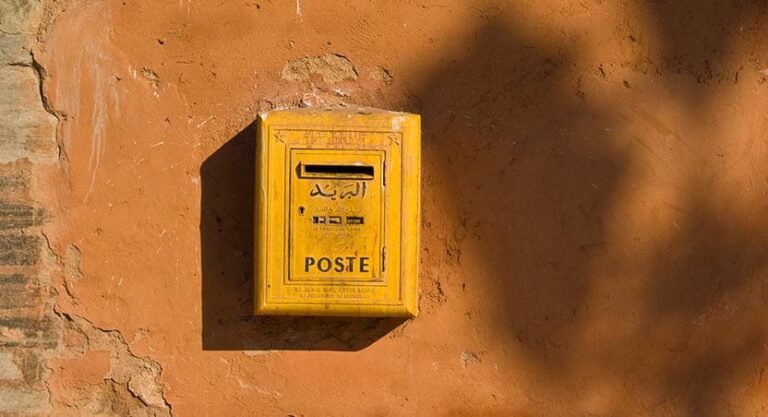Like anywhere else, when you set up a business in Morocco, the question arises of where to domicile your company.
There are three possible options:
- working from home
- use premises dedicated to the business
- working from home, or in a cyber café, but with a registered address.
In practice, most domiciliation companies offer fairly comprehensive service packages, which go far beyond the provision of an address, and often include the entire process of setting up the company, accounting services, and so on.
Domiciliating your company at home
This is possible for individuals and corporate entities alike, without any restrictions: in Morocco, there is no concept of residential premises by destination, or commercial premises.
The only requirement for individuals is to prove that they own the premises, or that they have the written (and legalised) agreement of the owner of the premises. This implies having a legal lease, but there is no additional tax for the owner.
For legal entities, the option of locating the registered office in a private home is limited to the home of the legal representative, usually the managing director. This is the perfect solution for SARLs AU.
Companies are subject to the same constraints as individuals: they must provide written proof of the agreement of the owner of the premises.
If the managing partner is also the owner of the premises, there will be a lease between the company and the managing partner. It is preferable for this agreement to be mentioned at the General Meeting and approved by it (in the case of regulated agreements with partners).
Using a company domiciliation service
Until now, the business of company domiciliation has been somewhat artistically blurred. A draft law aims to regulate it, and in particular to provide a framework for ancillary activities, such as drafting articles of association, carrying out the formalities involved in setting up a company, etc.
The main points are:
- the obligation for the domiciliary to be Moroccan (natural person or legal entity), to be a trader or, in the case of natural persons, not to have been convicted of acts that result in the loss of trader status, and in all cases to be up to date with tax payments
- the abolition of the regulatory six-month limit for a domiciliation, which was not applied in any case
- the intention to draw up a standard contract (by regulation)
- the domiciliation agent must verify the identity of the person being domiciled
- the domiciliation agent must make premises available; a simple post office box is not enough
Restrictions for regulated professions
The law imposes certain constraints on certain types of company/entrepreneur in terms of premises.
For example, travel agencies (and others) must have a minimum surface area, offices where customers can be received, and minimum equipment.
For this type of company, even if the law does not formally prohibit operating from home, in practice, approval will not be given without a lease on real business premises – unless your ‘home’ is a luxury villa with a large caretaker’s cottage overlooking the street, where you can fit out your premises.
Commercial lease or not?
Commercial leases apply to premises where a trader, industrialist or artisan carries on business. The status of commercial lease derives from the lease itself, and not from the nature of the activities carried out.
In other words, the agreement given by the owner to carry on a professional activity from home does not change the nature of the lease, which remains a residential lease. The person or company carrying on the business is not protected by the provisions of the law on commercial leases (dahir of 2 chaoual 1374 – 25 May 1955), and in particular is not entitled to:
- eviction compensation if the lease is not renewed
- transfer the lease as part of the sale of the business.
Similarly, the bill on domiciliation clearly states that domiciliation does not imply a commercial lease
The cost of a domiciliation
Prices vary widely, depending on the scope and quality of the services offered.
A ‘basic’ domiciliation in Casablanca costs around 400 dirhams (€40) per month, which includes the provision of an address, the possibility of receiving faxes and domiciling mail.
If you add the management of your accounts, you will need to calculate between 200 and 400 dirhams/month for a direct debit, and up to 1,000 dirhams/month for the management of a small payroll (less than five employees).
From 2,000 dirhams/month upwards, you can obtain fairly comprehensive off-site business management services (with delegated signing authority).
Points to pay attention to
Duration of the contract
It is better, at least in the beginning, to commit to short periods, with monthly invoicing, than to take out a two-year contract. While the price may seem more attractive, you may find yourself stuck after a few months if your business changes… or if you’re not satisfied with your service provider.
Quality of premises
Even if you never intend to use the premises, as a good technomad, don’t forget that, like everywhere else, there are more or less prestigious addresses. Take a look at Google Maps, and choose an address in a business district.
Quality of telephone answering services
The operator who takes your calls is supposed to be your employee in relation to your customers. A word of advice: test her! I won’t say any more…
Capacity of the domiciliation agent
If they take care of your accounts or payroll, check that the domiciliation agent has the capacity to do so: these are regulated professions, and not “everyone” has the right to file accounts.
 A typo or syntax error? You can select the text and hit Ctrl+Enter to send us a message. Thank you! If this post interested you, maybe you can also leave a comment. We'd love to exchange with you !
A typo or syntax error? You can select the text and hit Ctrl+Enter to send us a message. Thank you! If this post interested you, maybe you can also leave a comment. We'd love to exchange with you !




